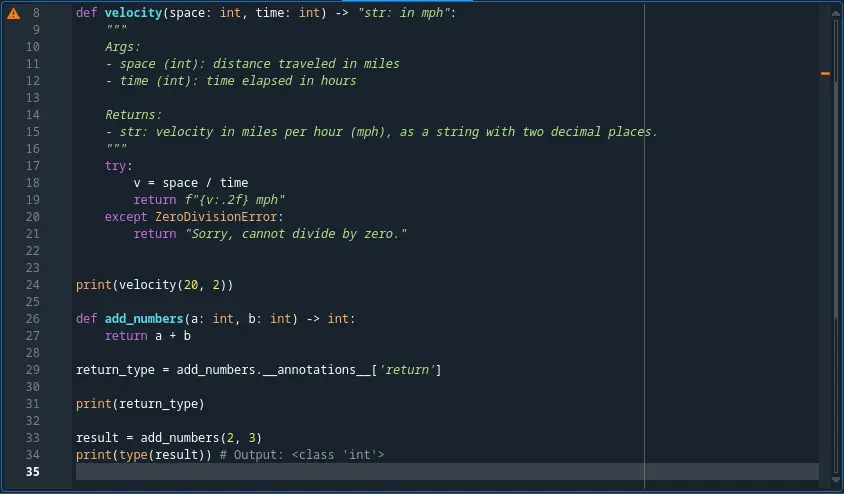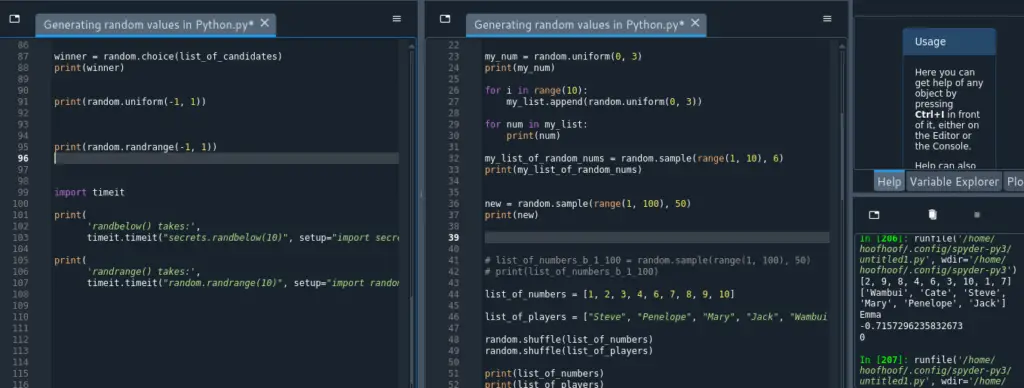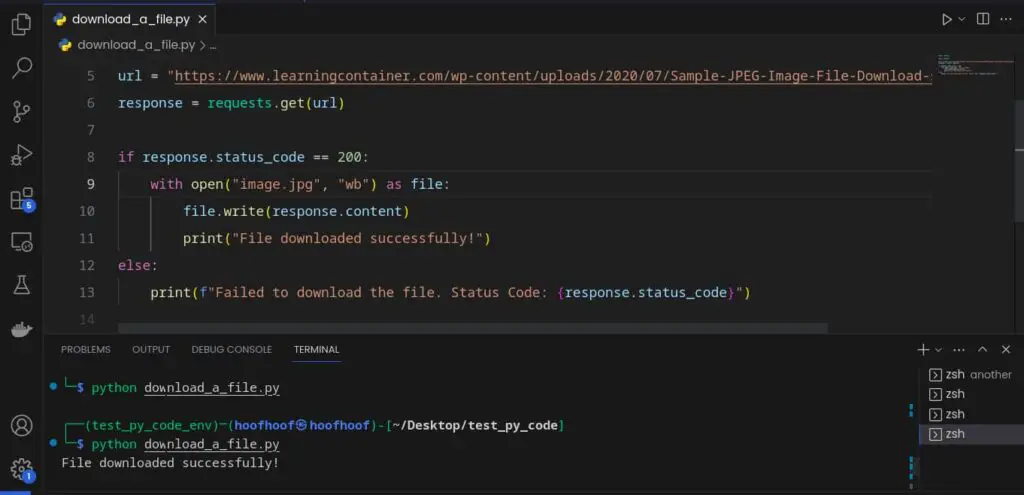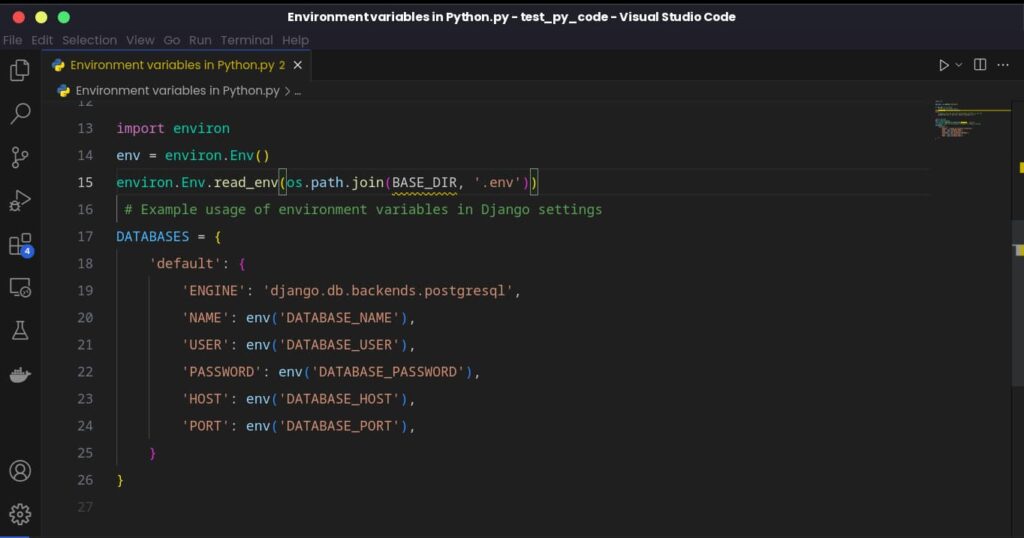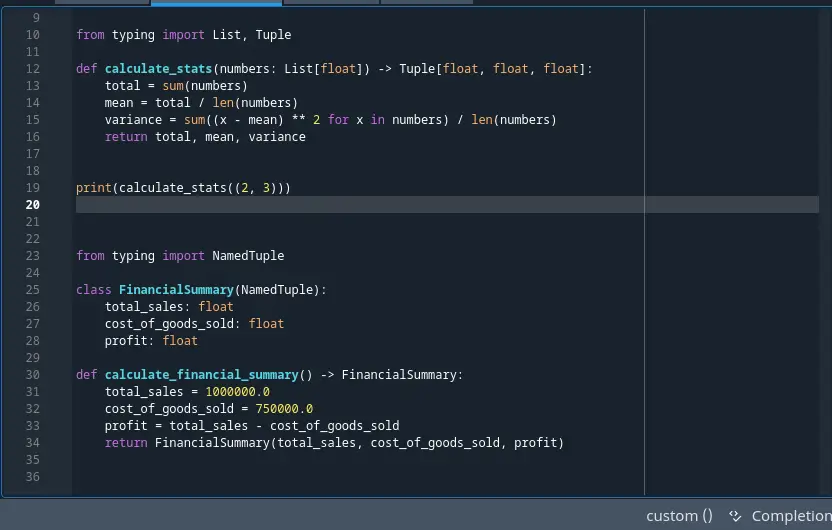Variables play a fundamental role in programming as they serve as containers for storing and manipulating data.
They act as placeholders that enable programmers to store values and access them later in the code.
Understanding how variables work and following proper naming conventions is crucial for writing clean and maintainable code.
In the context of Python programming, one specific concern that arises is whether Python variables can start with a capital letter.
So, can Python variables start with a capital letter?
Python variables can start with a capital letter. Variables in Python that can start with a capital letter are: class names often following the CamelCase convention, constants, enumeration types, known abbreviations, and environment variables. However, it is generally recommended to begin other variables with a lowercase letter, following the conventions outlined in Python’s style guide, known as PEP 8.
What is a variable name in Python with example?
In Python, a variable name is a user-defined identifier used to refer to a memory location that holds a specific value or data.
It serves as a label or reference to access and manipulate the stored data within a program.
Variable names in Python are case-sensitive, meaning that uppercase and lowercase letters are considered distinct.
To illustrate the concept of variable names in Python, let’s consider a few examples:
Example 1: Storing an Integer Value
age = 25
In this example, “age” is the variable name assigned to hold an integer value, which is 25.
Here, we have used lowercase letters to conform to the recommended naming convention.
Example 2: Storing a String Value
name = "John"
In this case, the variable name “name” is used to store a string value, which is “John”.
Again, we have followed the convention of using lowercase letters for the variable name.
Example 3: Using Underscores in Variable Names
max_value = 100
Here, the variable name “max_value” is composed of two words separated by an underscore.
This convention, known as snake_case, is often used to improve readability when variable names consist of multiple words.
Now that we understand what variables are,
What can Python variables start with?
Python variables can start with lowercase letters, underscores, or, in certain cases, uppercase letters.
When it comes to naming variables in Python, there are specific rules and conventions to follow.
Let’s explore the various options for starting a Python variable name:
1. Lowercase Letters: Variables in Python commonly start with a lowercase letter.
For instance:
name = "John"
age = 25
In these examples, “name” and “age” are variable names that begin with lowercase letters. This convention is widely used and recommended for general variable naming.
2. Underscore: Another valid option is to start a variable name with an underscore.
For example:
_count = 10
_name = "Alice"
Here, “_count” and “_name” are variable names that begin with an underscore.
This style, known as a leading underscore, is often used to indicate that the variable is intended for internal use within a class or module.
3. Uppercase Letters: While it is possible to start a variable name with an uppercase letter, it is generally not advised unless there is a specific reason to do so.
Python’s naming conventions suggest that variable names should typically start with lowercase letters.
However, there are certain scenarios where capitalized variable names can be used.
When to use capital letters in naming variables in Python
Capital letters in variable names can be used in situations such as defining constants or global variables, naming classes, working with enumerations, and when using acronyms or abbreviations.
While it is generally recommended to start Python variable names with a lowercase letter, there are certain situations where the use of capital letters can be appropriate and meaningful.
Let’s explore some of these scenarios:
1. Naming Constants or Global variables
Variables that represent constants, such as mathematical or scientific values, may be written in all capital letters.
When defining constants or global variables that are intended to remain unchanged throughout the program, capitalizing the variable name is a common convention.
This helps to visually distinguish them from regular variables and indicates their special significance.
For example:
PI = 3.14159
SPEED_OF_LIGHT = 299792458
In this case, “PI” and “SPEED_OF_LIGHT” are variables that consist entirely of capital letters, indicating their role as constants.
2. Defining Class Names
In object-oriented programming, class names are typically written using the PascalCase convention, where each word starts with a capital letter.
Since classes define objects with their own properties and behaviors, capitalizing the class name helps differentiate it from other variables.
It’s important to note that class names are not considered variables but rather identifiers for defining classes.
For example:
class MyClass:
# Class definition here
Here, “MyClass” represents the class name, and following the PascalCase convention, it highlights its distinction as a class.
3. When using enumeration types
When using enumerated types in Python, it is common to capitalize the names of the enumerated values to distinguish them from regular variables.
Consider the following example:
from enum import Enum
class Color(Enum):
RED = 1
GREEN = 2
BLUE = 3
In the above code snippet, the capitalized names “RED,” “GREEN,” and “BLUE” represent enumerated values for different colors.
4. When defining acronyms and abbreviations
When a variable name consists of acronyms or abbreviations, capitalizing the corresponding letters can enhance readability.
For instance:
HTML_PARSER = "BeautifulSoup"
Here, “HTML_PARSER” clearly indicates that the variable is associated with an HTML parsing library or module.
5. Naming environment variables
Capitalization in variable names is also relevant when naming environment variables.
Environment variables are commonly used in various programming contexts to store configuration settings that can be accessed by the application during runtime.
In Django projects, environment variables are often used to configure settings that can vary across different environments (e.g., development, staging, production).
While not exclusive to Django, it serves as an example of how capitalization can be applied.
Consider the following:
SECRET_KEY = os.environ.get('MY_APP_SECRET_KEY')
DEBUG = os.environ.get('MY_APP_DEBUG') == 'True'
In this example, the environment variables MY_APP_SECRET_KEY and MY_APP_DEBUG are assigned to the Django settings SECRET_KEY and DEBUG respectively.
Capitalizing these variables helps to distinguish them as essential configuration values that can be set externally.
System-level environment variables are often used to configure behavior across multiple applications or to store sensitive information.
Capitalizing these variables can aid in recognizing their significance.
For instance:
API_KEY = os.environ.get('API_KEY') DATABASE_URL = os.environ.get('DATABASE_URL')In the above example,
API_KEYandDATABASE_URLare system-level environment variables that hold sensitive information or critical configuration details.Capitalizing them helps to emphasize their importance and differentiate them from other variables in the codebase.
Capitalization in variable names is relevant when naming environment variables, such as in Django settings, system-level environment variables, and various programming languages/frameworks.
Following capitalization conventions enhances readability and distinguishes these variables as crucial configuration values.
Following these conventions will make your code more consistent and easier to understand for both yourself and other developers.
Best practices when using capital letters for variable names
When it comes to using capital letters in variable names, one of the key best practices is to maintain consistency throughout your project.
Consistency in naming conventions not only enhances the readability of your code but also promotes collaboration with other developers who may be working on the same project.
By maintaining a consistent naming convention, you make your code more clear and concise.
Clear and well-defined variable names enhance the understandability of your code, making it easier for both you and others to grasp the purpose and functionality of different variables.
When other developers or teammates review your code, they should be able to quickly comprehend its structure and purpose.
This fosters collaboration and minimizes the time and effort spent in deciphering variable names and their intended usage.
Additionally, when you revisit your own code after a while, consistent naming conventions help you remember the purpose of each variable, reducing the need for extensive comments and enabling you to make changes or enhancements more efficiently.
Conclusion
Python variables should generally start with a lowercase letter, following the conventions outlined in Python’s style guide.
Follow best practices in variable naming to improve the quality and readability of your code.
Consistency and clarity in naming conventions enhance code understandability and facilitate collaboration.
Apply these principles to your projects to become a more skilled programmer.
Create, inspire, repeat!

